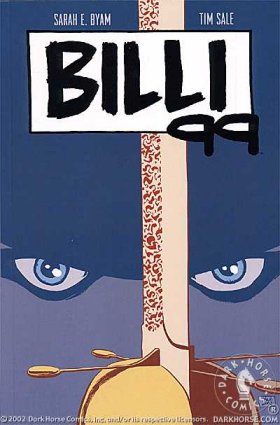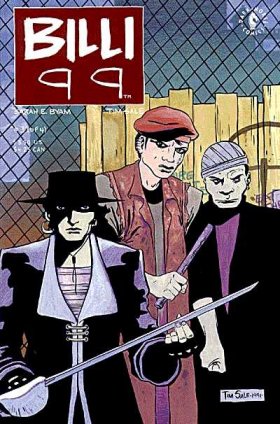| Billi
99
When Will
Eisner first published
A Contract With God in 1978, he called his work a
"graphic novel" for two reasons: the first being
that it was a story told with pictures (and in case anyone
is a little confused, that means "comic book") and
the second being that it was a complete story; having a beginning,
a middle, and an ending.
Comic
books have the problem of not being complete. Superman and
Batman have been running for decades and while the circumstances
and situations sometimes change for the characters, there
is never closure because the comic can't end.
So, in
our search for a real story, a full story, we have to turn
away from the two biggest mainstream publishers and look elsewhere.
And it just so happens that one alphabetical leap backward
from DC brings us to Dark Horse and a little book called Billi
99, written by Sarah Byam and drawn by Tim Sale.
Originally
published over a decade ago as single issues, Byam tells the
story of Billi Chadam, heiress to her father Ray Chadam's
fortune, his industry, and his alter-identity as The Sword
of Toleado, a Zorro-esque adventurer out to help the downtrodden.
At least
she would be the heiress if she weren't suspected of his brutal
killing. Now the police are after her and her corrupt Uncle
Cas is chomping at the bit to obtain the controlling stock
interest in her father's company. She can't tell the cops
how her father died as a result of his vigilante activities,
so she's hiding out in the bad part of town and watching all
that her father had built crumble. Now Billi has to find a
way to stop her uncle from taking over and putting a few thousand
workers out of a job, while still finding who had her father
killed.
Byam has
officially left comics, which is a shame because Billi
99 has some of the most solid storytelling of any comic
I have read. This book is dark and moody, but never depressing
or stagnant from too much poetic waxing. Byam has taken a
unique approach to writing a vigilante: she's very real with
the character and the world she inhabits.
Billi
is not a very good superhero; in fact, take the "super"
right out of the equation because, unlike Batman or Daredevil,
Billi really has no chance against a roomful of twenty or
more thugs. She actually almost loses the fight when she's
trying to save a Dorothy Dandridge-like singer from two goons
because if you get hit with a pipe, no matter how many years
you spend studying the ancient disciplines of Zen/Kung Fu/Bat-Kwan-Do,
it still hurts like Hell and may even kill you. (If only Billi
had some Bat-Goon-Repellant, then everything would be gravy.)
And Billi,
despite being the titular character, is far from the focus
of the book. Byam gives some great attention to the business
aspect of Uncle Cas's financial maneuvers, as well as the
human aspect affected by it, as she puts the reader right
into the homes and union hall meetings of the Chadam Industries
workers. We also get a taste of Detective Andrews, the local
cop trying to solve a series of murders that may be tied strongly
to Billi and her problems.
And "Hooray!"
for a multi-ethnic cast that is just plain interesting. I
like comics a lot but the W.A.S.P to Every-Other-Ethnicity
ratio in them is too one-sided. It is good to see characters
like Billi, of Spanish descent; Andrews, an African American;
Anunzio, Billi's Italian-American Mafioso boyfriend; and Quixote,
the white-haired, tie died, precognitive hippy (yes I did
just say "precognitive hippy").
The artwork
on this is Tim Sale at his best. If you ever read Batman:
The Long Halloween or
Superman for All Seasons,
you know his stuff is good. Let me tell you that it is even
better when done in black and white. Sale gets to play with
some great shading effects, using more shades of gray than
I thought humanly possible to discern.
This book
looks good and I can think of no one who draws a cityscape
or a tenement better than Sale, and is then still able to
draw characters that emote so well (except for Will Eisner
of course; I don't want to anger the comic book gods by not
including the master). All the characters in Billi 99
are invariably human and Sale complements Byam's humanistic
writing with his wonderful artwork.
Supposedly,
it's set in the future, but that is never really brought up
and since it was written a decade or so ago, the future it
may have been depicting seems very "in the now"
with its Big Business themes and plight-of-the-working-man
overtones (anyone else reminded of a little company called
Enron?). Pick this book up and enjoy it in its entirety. It
reads like a good prose novel and it's cheaper than a hardcover
at $14.95.
Billi
99
|







